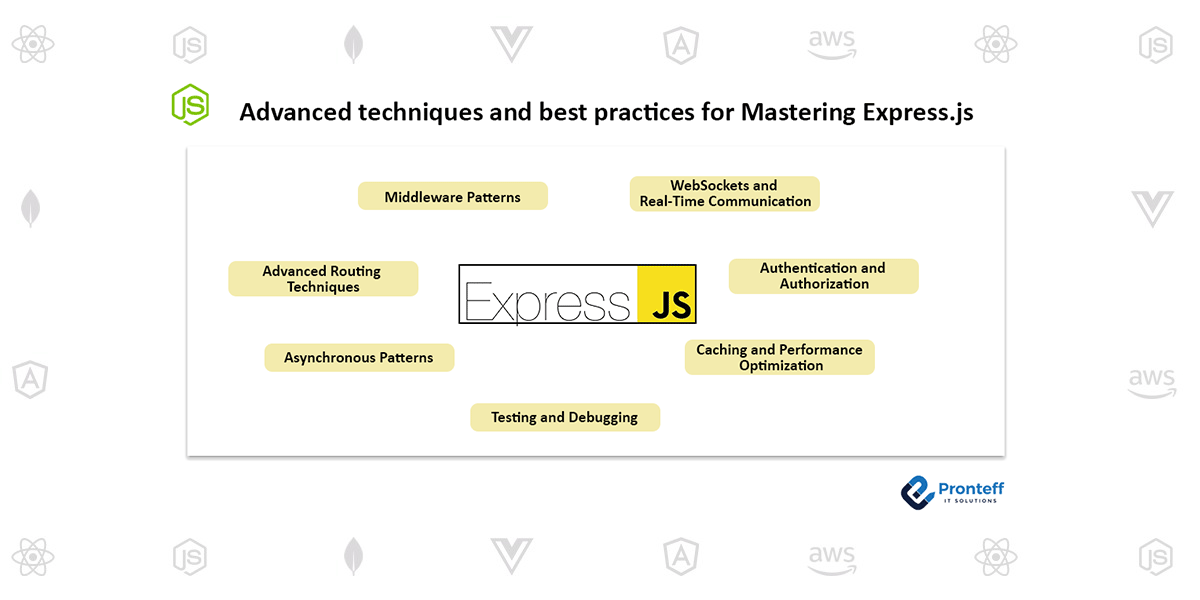Advanced techniques and best practices for Mastering Express.js
Here in this blog, we are going to learn the advanced techniques and best practices for Mastering Express.js.
Introduction:
Express.js is a widely used and powerful framework for building web applications and APIs with Node.js. While its simplicity is one of its strengths, Express.js offers a range of advanced techniques that can elevate your development to the next level. In this blog post, we’ll delve into some advanced techniques and best practices to help you become a proficient Express.js developer.
1. Middleware Patterns:
Custom Middleware:
Express middleware allows you to modify requests and responses globally. Learn how to create custom middleware for tasks like authentication, logging, and data validation. Organize your middleware effectively and understand the order in which they are executed.
Error Handling Middleware:
Advanced error handling is crucial for maintaining a robust application. Implement error-handling middleware to catch and respond to different types of errors, ensuring graceful degradation and improved user experience.
2. Advanced Routing Techniques:
Route Modularity:
As applications grow, keeping routes organized becomes important. Learn how to modularize your routes using routers to separate concerns and improve maintainability.
Route Parameters and Validation:
Handle dynamic route parameters more effectively and use libraries like Joi or Validator to validate and sanitize incoming data.
3. Asynchronous Patterns:
Async/Await with Express:
Integrate modern asynchronous patterns like async/await into your Express applications for more readable and maintainable code, especially when dealing with database queries and external APIs.
Promises and Error Handling:
Understand how to handle promises in your routes and middleware effectively. Learn techniques for catching and handling promise rejections.
4. WebSockets and Real-Time Communication:
WebSocket Integration:
Explore integrating WebSocket communication into your Express application for real-time features. Learn about libraries like ws and how to manage bi-directional communication.
Real-Time Notifications:
Implement real-time notifications using WebSockets to notify clients of updates without the need for constant polling.
5. Authentication and Authorization:
Role-Based Authorization:
Implement role-based access control to manage different levels of authorization for different user roles.
Token Revocation:
Learn about techniques to revoke or expire tokens to improve security and user management.
6. Caching and Performance Optimization:
Caching Strategies:
Implement caching using middleware or third-party libraries like node-cache to optimize database queries and reduce server load.
Content Delivery Networks (CDNs):
Learn how to integrate CDNs for serving static assets efficiently, improving the performance of your application.
7. Testing and Debugging:
Unit Testing with Mocha and Chai:
Explore unit testing for your Express routes and middleware using popular testing frameworks like Mocha and assertion libraries like Chai.
Debugging Express Applications:
Learn advanced debugging techniques using Node.js built-in debugger and tools like node-inspect for troubleshooting complex issues.
Conclusion:
Express.js provides a solid foundation for building web applications, and its advanced features and best practices can take your development skills to new heights. By mastering custom middleware, advanced routing, asynchronous patterns, real-time communication, authentication, performance optimization, and testing, you’ll be well-equipped to build robust, scalable, and high-performing applications with Express.js. Remember that continuous learning and practice are key to becoming an expert Express.js developer.







